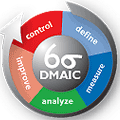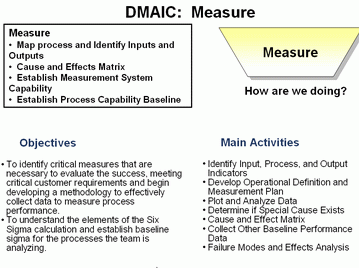Step Two – Measure Phase
The capability and stability of the project Y is established by the top Belt.  This individual will also conclude the ability to measure the Y. When the project is obviously outlined with a clearly quantifiable Y, the process is scrutinized to define the Key Process Steps, as well as the Key Inputs for every process. Once the Key Input list is produced, the Belt will determine the possible influence on CTQs that every input has in connection to the faults that are being produced within the process. Each Key Inputs is then prioritized to create a “short list” that can be scrutinized more precisely. The “short list” will be used by the Belt to narrow down the possible methods that could result in an error or how the input might become flawed. FMEA is the most effective system for this process. Any input failures can quickly be defined and preventive action strategies established.
This individual will also conclude the ability to measure the Y. When the project is obviously outlined with a clearly quantifiable Y, the process is scrutinized to define the Key Process Steps, as well as the Key Inputs for every process. Once the Key Input list is produced, the Belt will determine the possible influence on CTQs that every input has in connection to the faults that are being produced within the process. Each Key Inputs is then prioritized to create a “short list” that can be scrutinized more precisely. The “short list” will be used by the Belt to narrow down the possible methods that could result in an error or how the input might become flawed. FMEA is the most effective system for this process. Any input failures can quickly be defined and preventive action strategies established.
Having correct metrics is an important part of the Measure phase. Therefore, it is vital that metrics be validated as reliable during the Measure phase, so that the progress of the project can be accurately monitored. Tracking project metrics is best done by using Business Process Charting methodologies.

 Go to Analyze Step Three
Go to Analyze Step Three
Project Example for Six Sigma DMAIC
Click Here for Onsite Information

 This individual will also conclude the ability to measure the Y. When the project is obviously outlined with a clearly quantifiable Y, the process is scrutinized to define the Key Process Steps, as well as the Key Inputs for every process. Once the Key Input list is produced, the Belt will determine the possible influence on CTQs that every input has in connection to the faults that are being produced within the process. Each Key Inputs is then prioritized to create a “short list” that can be scrutinized more precisely. The “short list” will be used by the Belt to narrow down the possible methods that could result in an error or how the input might become flawed. FMEA is the most effective system for this process. Any input failures can quickly be defined and preventive action strategies established.
This individual will also conclude the ability to measure the Y. When the project is obviously outlined with a clearly quantifiable Y, the process is scrutinized to define the Key Process Steps, as well as the Key Inputs for every process. Once the Key Input list is produced, the Belt will determine the possible influence on CTQs that every input has in connection to the faults that are being produced within the process. Each Key Inputs is then prioritized to create a “short list” that can be scrutinized more precisely. The “short list” will be used by the Belt to narrow down the possible methods that could result in an error or how the input might become flawed. FMEA is the most effective system for this process. Any input failures can quickly be defined and preventive action strategies established.





